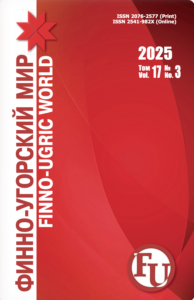Expression of gonorative deixis in Finno-Ugric languages (comparative analysis)
Vantsova Tatiana G.,
Candidate Sc. {Philology}, Associate Professor, Department of Cultural and Ethnic Culture, Ogarev Mordovia State University (Saransk, Russia), vancova_tatyana@mail.ru
The article makes the comparative analysis of polite forms of addressing, expressed by personal pronouns in the Hungarian, Finnish, Estonian, Vepsian, Karelian, Komi-Zyryansky, Komi-Permian, Mansi, Khanty, Mari, Mordovian (Moksha, Erzya) and Udmurt languages.
Keywords: pronoun forms of politeness; you as a form of communication; speech etiquette; communication; official context; grammatical form of words; address; Finno-Ugric languages.
1. Ariskina, T. P. (2007), Expression of speech etiquette in the Erzya and Hungarianlanguages, dissertation (Candidate Sc. {Philology}), Saransk.
2. Ariskina, T. P. (2006), Forms of communication to you / you in Erzya and Hungarian, Chuvashia University Bulletin, № 7, p. 112–116.
3. Guskova, A. P. and Tudvaseva, Z. K. (1999), Features of functioning of the pronominal forms of politeness in modern Finno-Ugric languages, Linguistica Uralica, № 3, p. 177–183.
4. Katsiba, A., Krasil’nikov, A., Ushakov, G. (1991), Udmurt speech etiquette in the mirror of the Hungarian and English correspondence, Izhevsk: Udmurt University Press.
5. Kuznetsov, A. V. (2008), Speech etiquette of the peoples of the Volga-Ural area, Cheboksary: Chuvash State Institute of Human Sciences.
6. Maytinskaya, K. E. (1955), Hungarian language, in 2 Vol., Vol. 1, Moscow: USSR Academy of Sciences Press.
7. Lomshina, E. N., Vantsova, T. G., Polyakov, O. E. (2016), Phrasebook on speech etiquette of Finno-Ugric Peoples, Budapest: Institute of NH – Collegium Fenno-Ugricum.
8. Reznikova, E. V. (2009), Personal pronouns and etiquette, Chelyabinsk State University Bulletin, № 27, p. 119–125.
9. Filippov, A. V. (1988), Grammatical borrowing in the Russian language, Russian language for Secondary School, № 6, p. 58–62.
10. Honkanen, T., Ludina, R., Venchugova, M. (2004), Some national features of Russian and Finnish Business Conduct, Communicative behavior, Vol. 20. Russian and Finnish communicative behavior,Voronezh: Istoki, p. 49–54.
11. Shafikov, S. G. (2011), Europe in the light of courtesy pronouns, Human factor in language and culture: collection of articles, Ufa, p. 88–94.
12. Shafikov, S. G. (2012), Respectful address in the European languages, and the problem of Russian Bashkir addressive case, Bashkir State University Bulletin, Vol. 17, № 1, p. 133–138.






















